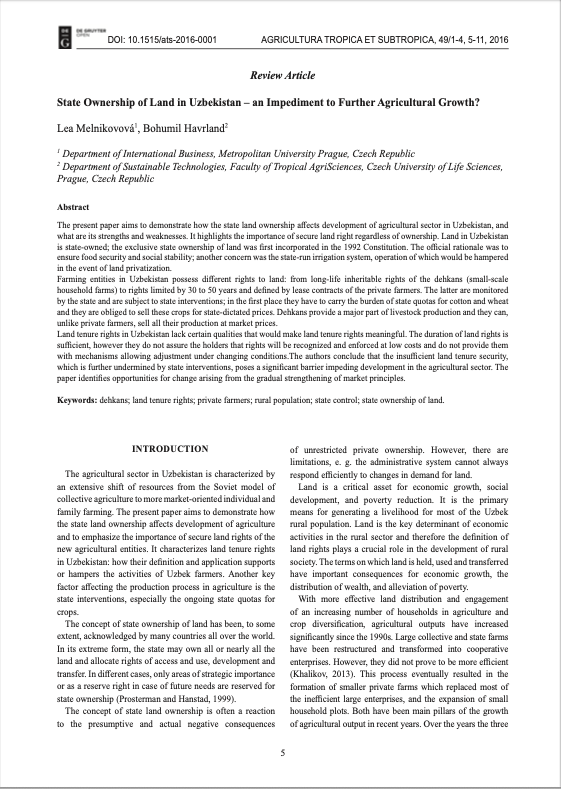Post-conflict land governance reform in the African Great Lakes region. Part II - Reshuffling land ownership for development
The assertion of rights to agro-pastoral land in North Cameroon: a cascade to violence?
What are the key causalities in the linkages between environmental resource scarcity, the non-violent assertion of rights to the environment and the (non) avoidance of violence itself? Focusing on the natural resource land, the author studies three different cases of conflict over land at the local level in Diamar‚, Baba Deli and Kubadje, in the extreme north of Cameroon, from 2001 to 2004, using different sociological, geographical and anthropological methods.
The assertion of rights to agro-pastoral land in North Cameroon: a cascade to violence?
What are the key causalities in the linkages between environmental resource scarcity, the non-violent assertion of rights to the environment and the (non) avoidance of violence itself? Focusing on the natural resource land, the author studies three different cases of conflict over land at the local level in Diamar‚, Baba Deli and Kubadje, in the extreme north of Cameroon, from 2001 to 2004, using different sociological, geographical and anthropological methods.
Les défis de la réforme foncière post-conflit
Competing jurisdictions: settling land claims in Africa
The papers included in this volume were earlier presented at a conference on the settlement of land claims in Africa, which was held in Amsterdam in September 2003. The papers are written primarily from an anthropological perspective.
Post-conflict land governance reform in the African Great Lakes region. Part III - Securing tenure of smallholder peasants.
Compensation for Expropriated Community Farmland in Nigeria: An In-Depth Analysis of the Laws and Practices Related to Land Expropriation for the Lekki Free Trade Zone in Lagos
In Nigeria, the recurring impoverishment and other negative socioeconomic impacts endured by landholders affected by expropriation are well-documented and call into question the Land Use Act's (LUA) effectiveness in protecting local land rights. The World Bank's Land Governance Assessment Framework found that, in Nigeria, "a large number of acquisitions occurs without prompt and adequate compensation, thus leaving those losing land worse off, with no mechanism for independent appeal even though the land is often not utilized for a public purpose".
Towards Responsible Consolidation of Customary Lands: A Research Synthesis
The use of land consolidation on customary lands has been limited, though land fragmentation persists. Land fragmentation on customary lands has two main causes—the nature of the customary land tenure system, and the somewhat linked agricultural system. Since attempts to increase food productivity on customary lands have involved fertilisation and mechanisation on the small and scattered farmlands, these approaches have fallen short of increasing food productivity.
What constraints the expansion of urban agriculture in Benin?
Propelled by rapid urbanization, city administrations in low-and middle-income countries face a raft of challenges to secure food and nutrition for its poor urban dwellers. Urban agriculture (UA) seems a viable intervention to address urban food insecurity, however, experience has shown that urban gardens do not expand at the expected rate. Tackling this issue requires a deeper understanding of the main constraints that block UA expansion. Benin is not an exception; the country witnesses a breathtaking growth of its main cities that is in synchronization with a mounting food insecurity.
Reflections on How State–Civil Society Collaborations Play out in the Context of Land Grabbing in Argentina
We examine collaborations between the state and civil society in the context of land grabbing in Argentina. Land grabbing provokes many governance challenges, which generate new social arrangements. The incentives for, limitations to, and contradictions inherent in these collaborations are examined. We particularly explore how the collaborations between the provincial government of Santiago del Estero and non-government organizations (NGOs) played out. This province has experienced many land grabs, especially for agriculture and livestock production.
State Ownership of Land in Uzbekistan – an Impediment to Further Agricultural growth?
The present paper aims to demonstrate how the state land ownership affects development of agricultural sector in Uzbekistan, and what are its strengths and weaknesses. It highlights the importance of secure land right regardless of ownership. Land in Uzbekistan is state-owned; the exclusive state ownership of land was first incorporated in the 1992 Constitution. The official rationale was to ensure food security and social stability; another concern was the state-run irrigation system, operation of which would be hampered in the event of land privatization.


